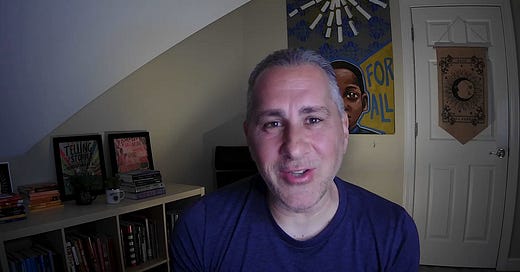Fatigue is one of the greatest threats we face right now: physical, emotional, mental, spiritual, and relational.
We can avoid fatigue by continually asking: “What is mine to carry?” As we see, encounter, and become aware of so much pain and injustice and trauma, what of it do we have the ability to respond to? What do we not have control over? What do we need to let go of so that we can respond more effectively in the places we do have agency.
If we’re doing self-care in the sh*t storm, think of these daily practices as your poncho:
These are essential expressions of self-compassion.
1. Engage and withdraw.
A healthy response to the wounds of the world involves a two-step dance of engaging and withdrawing: of doing work, confronting injustice, being in the fray—and finding regenerative rest. In addition to your activism, take time for “inactivism,” Withdraw into whatever allows you to breathe and recalibrate: silence, solitude, nature, prayer, meditation.
2. Wisely wield social media.
Get on social media: Find tribes of affinity, be informed, and look for ways to perpetuate goodness by using your voice. You can be an independent news outlet.
Get off social media: Have the fears right sized by not having them artificially multiplied or enlarged.
3. Practice strategic levity.
Intentionally spend time with people, read things, or watch things that make you laugh. That laughter is empowering. It helps you remember that as difficult as things may be, if you can laugh you haven’t been fully overcome. Joy a strident middle finger to the miserable people and disheartening realities.
4. Get out of your head.
We’re always trying to think our way out of the massive and sprawling systemic ills and national crises. We need to do something that intentionally gets us out of our heads: walking, exercising, playing a sport, playing with our dogs, kids, or grandchildren. Sweat, let oxygen course through you, allow your blood to flow, and allow your body to take the focus of your mind for a bit.
5. Follow your muse.
Creativity allows us to tap into our humanity and to connect to the humanity of others. It is restorative and enriching in ways few other things are. Whether you paint, make music, garden, scrapbook, build things, or bake—stay connected to the source of what inspires you.
6. Take a hope inventory.
Hope is an aspirational orientation. It helps propel us into days we wouldn’t otherwise walk into. It helps us to see on the horizon a reason to keep going. It is future-focused. Make a list of where you see people individually or collectively doing things that remind you good people still inhabit this place.
7. Cultivate gratitude.
Unlike hope, gratitude is present-focused. It allows us to see what is worth celebrating even if nothing changes. Make time to take note of what makes this life worth being here for.
8. Know who you aren't.
We need to have the humility to admit and respect our limits. Yes, you are a once-in-history, never-to-be-repeated creation with gifts, talents, and experiences that no one has ever had—but you are finite in your emotional and physical resources. Resist the ego that says you can’t afford to step away for a bit. You have to.
9. Share the load.
Community is medicinal. In our tribes of affinity, we can find strength and are lifted and we realize we are not carrying the weight of the world alone.
10. Do daily maintenance. Repeat.
It’s easy to neglect the small, elemental, yet critical daily maintenance of my physical and emotional health.
Make incremental changes in as many areas as you can: quality sleep, exercise, good nutrition, hydration—and be relentless in repeating them every day.
The key here is to get simple wins and build momentum through repetition.
Questions:
When thinking about the simple, elemental strategies list we just went over for sustainable compassion, where have you noticed a lack or gap in your daily practices where you could benefit from a greater investment?
Is there a practice or rhythm that you feel is important that wasn’t among the list shared?
We heard the difference between gratitude and hope, with the former being present-focused and the other being future-focused. Do you tend to have more difficulty with gratitude or hope lately?
This self-care all matters because: you are the greatest resource you have in making the world more compassionate—and the world needs it.
It's really a wonder that I haven't dropped all my ideals, because they seem so absurd and impossible to carry out. Yet, I keep them because in spite of everything, I still believe that people are really good at heart.
- Anne Frank
We will save the small world in the small, close, here, and now of our daily lives.
Remember you always have proximity and agency
Take care of yourself so that you are in this for the long haul and attending to the wounds of the world with as little collateral damage as possible.
Then, with your gifts and your talents and your position and your privilege and your platform and your resources, save what you can.
When I was a boy and I would see scary things in the news, my mother would say to me, "Look for the helpers. You will always find people who are helping.
- Fred Rogers
It’s good to remember we can still look for the helpers. It’s also a beautiful thing to remember that we can be the ones others look to and we can remind them that good people still inhabit this place.













Share this post